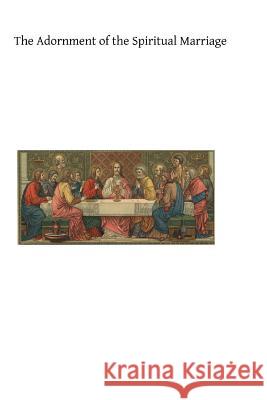The Adornment of the Spiritual Marriage » książka
The Adornment of the Spiritual Marriage
ISBN-13: 9781494984335 / Angielski / Miękka / 2014 / 292 str.
J AN VAN Ruysbroeck-three of whose most important works are here for the first time presented to English readers-is the greatest of the Flemish mystics, and must take high rank in any list of Christian contemplatives and saints. He was born in I273, at the little village of Ruysbroeck or Ruysbroeck between Brussels and Hal, from which he takes his name; and spent his whole life within his native province of Brabant. At eleven years old, he is said to have run away from home and found his way to Brussels where he was received by his uncle Jan Hinckaert, a canon of the Cathedral of 5t Gudule. Hinckaert, who was a man of great piety, lived with another devout priest named Francis van Coudenberg in the most austere fashion; entirely devoted to prayer and good works. The two ecclesiastics brought the boy up, and gave him a religious education, which evidently included considerable training in theology and philosophy subjects for which he is said to have shown, even in boyhood, an astonishing aptitude. In 1317 he took orders, and obtained through his uncle's influence a prebend's stall in St Gudule; a position which he occupied for twenty-six years. During youth and early middle-age, then, Ruysbroeck lived in Brussels, fulfilling the ordinary duties .of a cathedral chaplain: and here some of his earlier works may have been written. Here no doubt he developed that shrewd insight into human character to which his books bear witness; and here gained his experience of those false mystics and selfsufficient quietists so vividly described and sternly condemned in the second book of The Adornment of the Spiritual Marriage, in The Book of Truth, and other places. In the early fourteenth century a number of heretical sects, of which the Brethren of the Free Spirit were typical, flourished in the Low Countries. Basing their doctrine on a pantheistic and nonChristian conception of the Godhead, they proclaimed the divinity of man, and preached a quietism of the most soul-destroying kind, together with an emancipation from the fetters of law and custom which often resulted in actual immorality. As Ruysbroeck grew in knowledge of tIle true contemplative life, the dangers attending on its perversion became ever more clear to him: and he entered upon that vigorous campaign against the heretical quietists which was the chief outward event of his Brussels period.
Zawartość książki może nie spełniać oczekiwań – reklamacje nie obejmują treści, która mogła nie być redakcyjnie ani merytorycznie opracowana.











